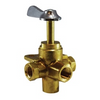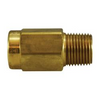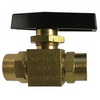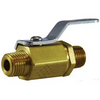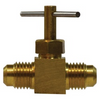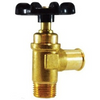Brass Valves
Brass valves offer a cost-effective, durable, and versatile option for a wide range of common applications. Brass is an alloy of copper and zinc that's highly valued for its good corrosion resistance, strength, and ease of machining. AFT offers a wide-selection of brass valves including: 3-Way & 4-Way valves, check & marine valves, industrial instrumention ball valves, miniature ball valves, needle valves, truck drum solid bottom valves and more.
Brass valves are a popular choice for many systems where the fluids aren't highly corrosive or at extremely high temperatures and pressures.
-
Residential and Commercial Plumbing: Brass is the go-to material for water supply lines, faucets, and other plumbing fixtures because it's durable and resistant to corrosion from water. Be sure to use lead-free brass valves for potable (drinking) water applications to comply with safety standards.
-
HVAC Systems: These valves are commonly used in heating, ventilation, and air conditioning systems to control the flow of water and other fluids.
-
Natural Gas Lines: Brass valves are often used for gas shut-off applications due to their durability and tight sealing capabilities.
-
General Industrial Use: They work well for managing the flow of various fluids like air, oil, and non-corrosive chemicals in industrial processes.
Advantages & Disadvantages of Brass Valves
When choosing a valve material, it's important to weigh the pros and cons of brass against other options like stainless steel or PVC.
Pros:
-
Cost-Effective: Brass is generally less expensive than stainless steel, making it a budget-friendly choice for many projects.
-
Durability and Strength: It's a strong, robust material that can withstand moderate pressure and temperature ranges.
-
Corrosion Resistance: It has good resistance to rust and corrosion in water and neutral pH environments.
-
Easy to Work With: Brass is a relatively soft metal, which makes it easy to machine, weld, and install.
Cons:
-
Limited High-End Performance: For extremely high temperatures, pressures, or highly corrosive environments (like saltwater or strong chemicals), stainless steel or other specialized alloys are a better choice.
-
Dezincification: In certain aggressive water conditions, the zinc can leach out of the brass, leaving behind a weak, porous copper structure that is prone to failure.
-
Lead Content: Some older or non-certified brass valves may contain lead, which is a concern for drinking water systems. Always choose lead-free brass for these applications.

